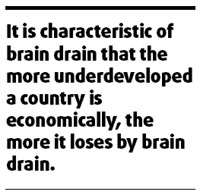Time for Asia to reverse the brain drain
By Zulfiquer Ahmed Amin (China Daily)
Updated: 2008-04-08 07:38
Updated: 2008-04-08 07:38
In a recent get-together of all my friends who graduated from Jhenidah Cadet College, it was like a bolt from the blue when we discovered that only 23 out of 48 of us are still living in Bangladesh, while the rest have gone abroad.

It was the same distressing revelation when we found that 69 out of 136 friends who graduated from Dhaka Medical College have committed their services to another nation.
Trained and skilled people constitute a very scarce resource for poor countries. Losing them sets development back in these countries. In fact, many countries, having lost their best brains to the industrial world, have had to import expensive consultants from abroad.
A country spends its precious resources to educate and train its people. Losing them to developed countries is a form of reverse foreign assistance, from resource-poor to resource-rich countries.
Brain drain - the emigration of skilled workers that takes away this human ingenuity - is pervasive in most least developed countries (LDCs), and is a serious barrier to using technology to help such nations expand their economies and raise living standards.
The work of skilled professionals is a precondition for upgrading the productive structures, and for improving the sophistication of domestic businesses - not to mention improving domestic health and education, which benefits the entire population.
Without enough trained agronomists, biologists, engineers, scientists, doctors, nurses and information and communication technology (ICT) professionals, it is impossible for the LDCs to use technology to promote their products and efficiency - and that makes it difficult for them to face foreign competitors. Lost human capital, thus, cripples a nation.
In a country like Bangladesh, where most of the people are illiterate, advancement in development is at stake. On the other hand, the ones who are educated and capable of contributing toward the growth of the nation prefer to live abroad.

Statistics show that, in Bangladesh, 65 percent of all newly graduated doctors seek jobs abroad and the country loses 200 doctors from the government sector each year, while there are millions of children suffering from malnutrition and childhood diseases.
Moreover, every year thousands of people die due to untreated diseases. The Organization for Economic Cooperation and Development recently reported that in 2005 between a quarter and a third of all practicing doctors in countries such as Britain, the United States, Canada and Australia were trained in another country.
India is the world's biggest exporter of doctors. The impact of the brain drain can be seen in this disturbing statistic: there is one Indian doctor in the US for every 1,325 Americans. However, there is only one Indian doctor in India for more than 2,400 Indians.
It is characteristic of brain drain that the more underdeveloped a country is economically, the more it loses by brain drain, while only developed countries profit from the process.
Brain drain is also kindled by the actually realized intention of the developed countries to acquire intellectual capital free, and as quickly as possible.
The time has come to reverse this devastating situation before irreversible damage is done to resource starved poor nations. To begin with, we need to think about why we are failing to keep our brains within our own heads.
We need to focus on addressing rationally the push and pull factors responsible for brain drain to augment brain gain instead.
This trend can be ended, largely by creating conditions that make pursuit of excellence possible, and by making it promising for an engineer, a doctor, scientist or other professional to find personal and professional fulfillment.
We desperately need our brains to be contained in our own heads to maintain a momentum of development.
The author is a physician, and specialist in Public Health Administration and Health Economics The Daily Star
(China Daily 04/08/2008 page9)
|
|
|
|